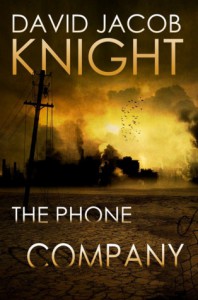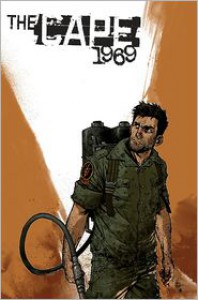Ex libris de librum vermis
Currently reading
Avoid!

*I received the ebook copy from Booklikes giveaway but this has not affected my review and rating in any way.
This was the most horrible book I read - I only finish it as a penance for asking it through giveaways (be careful what you wish for) and in order to write this review. I simply cannot give it even one star as it would be unjust towards other books on my list having the same rating while not suffering from lack of style, characters, motivation, meaningful story...
I was interested in this book because whole my career has been around telephony and contact centers, not mentioning technology, and it had that quote from Arthur Clarke in the description ("Any sufficiently advanced technology is indistinguishable from magic."). It also had more than ok reviews. It turned out that it is just a poor mish mash of (badly written) contemporary scares from high school shooting to plane hijacking, from referencing Stephen King (Needful things, Dead zone, King himself, even his famous: "Don't pass go"...) to attempt at tapping Lovecraft, from Invasion of body snatchers to indigenous curse connected to the cracks in the earth, from technology scares to privacy concerns... It is simply a trope of horror commonplaces in which authors keep jumping from one to the other at will.
This novel is attempt at horror but the only horrible thing is the prose itself! Here are some quotes to illustrate:
He realized on some level, in his paranoid reptilian brain, he was afraid Bill might be right. Ever since The Phone Company had blown into town like some weed, everything had started to fall apart. Steve had been the only one to see that, until now. So Bill seemed to be on his side. But at the same time, Steve knew Bill was totally insane.
Steve found himself getting hot from the yolk of sun spilling into his lap.
The sensation shifted, and it felt more like he’d swallowed a bunch of change, which he was pretty sure he hadn’t.
Explicitly admitted absence of motivation:
The Phone Company was evil. Who could even grasp their motives, their needs?
Some unexplained shifts in main character's actions:
He just knew this was his fault, and he could fix it.
then after a couple of paragraphs:
No, he was done saving the world. He had failed, and now it was someone else’s turn to pull the sword from the rock.
On top of that some universal questions:
The question he struggled with the most, though, was this: if there was so much evil in the world, and it was so pervasive, was there an equal or greater opposite force?
and cocktail party topics to amaze:
And now the NSA’s building quantum computers so they can break through any encryption. They can spy on anything they want to, only someone’s already done that. I was looking it up, and I guess Tesla was talking about cell phones over a century ago, can you believe that?
It is an exemplary read of what should be avoided if you are aspiring writer.
(More than) Interesting story collection

*I received the ebook copy from Booklikes giveaway but this has not affected my review and rating in any way.
Stories in this collection really reminded me of Carver, and I think it as a compliment, too. Author chooses (more or less) ordinary situations in life of (more or less) ordinary characters, represent them truthfully yet makes them interesting in a style that makes you completely hooked and also compels you to thing about much more than just situation or characters or the story itself. That self reflecting impulse is what makes stories great.
Unfortunately, where these stories fall short of greatness is the ending. Endings feel like some pseudo psychoanalytical resolve, completely out of tune (you can feel it in some stories occasionally - unbelievably supportive partners, completely calm and understanding) with the tone of the stories. They feel artificial and break the momentum these stories build. To a much lesser degree, some of the stories have unnecessary Jewish references that do not resonate with the stories themselves in any noticeable way. If these things were a bit better realized, these stories would be magnificent!
Games People Play: The Psychology of Human Relationships
 Fantastic look at people through the transactions they make with others. Important for understanding everyday relationships and something to keep in mind and (self-)analyze regularly.
Fantastic look at people through the transactions they make with others. Important for understanding everyday relationships and something to keep in mind and (self-)analyze regularly.Examples of the games are mostly outdated, but still give a relevant starting point to recognize the patterns.
Horrorstor
 For everyone who has ever visited an Ikea store and spent too much time browsing, even moving away from Bright and Shining Path (or maybe even doing something sacrilegious like going in the opposite direction :)
For everyone who has ever visited an Ikea store and spent too much time browsing, even moving away from Bright and Shining Path (or maybe even doing something sacrilegious like going in the opposite direction :)Quick and enjoyable read, though I expected it to be even more catalogue like.
The Strange Library
 First book for children by Murakami and it is completely immersed in his surreal world. It is a bit macabre, reminiscing original Grimm tales. I cannot shake a feeling that he wanted to convey the idea that libraries can prepare you for living - even encountering hard times that leave you at the beginning of [b:The Stranger|49552|The Stranger|Albert Camus|https://d.gr-assets.com/books/1349927872s/49552.jpg|3324344].
First book for children by Murakami and it is completely immersed in his surreal world. It is a bit macabre, reminiscing original Grimm tales. I cannot shake a feeling that he wanted to convey the idea that libraries can prepare you for living - even encountering hard times that leave you at the beginning of [b:The Stranger|49552|The Stranger|Albert Camus|https://d.gr-assets.com/books/1349927872s/49552.jpg|3324344].
Revival
 This is one of those rare examples of King's books that never should have seen the light of day in this form (like The Tommyknockers). It suffers from bloating, uninspired telling of uninteresting facts of not particularly involving characters in the first place. The closest King gets to unsettling (and he aims for Lovecraftian universe) is a small episode of curing the heroin addiction with secret electricity. Even grand finale falls rather flat and unexciting ( just bringing someone back to life, really? It was the beginning of Frankenstein, after all. )
This is one of those rare examples of King's books that never should have seen the light of day in this form (like The Tommyknockers). It suffers from bloating, uninspired telling of uninteresting facts of not particularly involving characters in the first place. The closest King gets to unsettling (and he aims for Lovecraftian universe) is a small episode of curing the heroin addiction with secret electricity. Even grand finale falls rather flat and unexciting ( just bringing someone back to life, really? It was the beginning of Frankenstein, after all. )I still believe it would make a good short story, if only heavily edited to keep just those few important events (probably rearranged in reverse order).
Fajront u Sarajevu
 Iako nisam preveliki ljubitelj Zabranjenog pušenja, neke njihove pesme su zaista obeležile i moje detinjstvo i kasniji život. O Nadrealistima da i ne govorimo. Kako je Fajront u Sarajevu bio reklamiran kao autobiografija Neleta Karajlića jedva sam čekao da otkrijem svu priču u pozadini i benda i serije.
Iako nisam preveliki ljubitelj Zabranjenog pušenja, neke njihove pesme su zaista obeležile i moje detinjstvo i kasniji život. O Nadrealistima da i ne govorimo. Kako je Fajront u Sarajevu bio reklamiran kao autobiografija Neleta Karajlića jedva sam čekao da otkrijem svu priču u pozadini i benda i serije. Na žalost, iako Nele opisuje svoj život i Sarajevo, knjiga se prevashodno bavi raspadom Jugoslavije (otuda i taj naziv - Fajront u Sarajevu) i to kroz lična razmišljanja kroz koja provejava seta za starom Jugom kao i upitanost kako je sam narod dozvolio da do raspada dođe. Nele jeste beskrajno iskren u tome, ali se zadržava na opštim stvarima koje su svima koji su živeli na tim područjima u toku i nakon raspada više nego dobro poznate.
Ono što nedostaje ponajviše u ovoj knjizi je lični doživljaj! Nele sve vreme izbegava bilo kakav intimni detalj, tek ponegde dajući naznaku šta se dešavalo. Sve što se tiče i benda i serije i ljudi sa kojima ih je radio ne sadrži ništa više od već opšte poznatih mesta koja su uveliko deo popularne kulture i mitologije koja je nastala oko Novog primitivizma.
Thumbprint
 A mediocre story with the uninspired realization riding on the wave of revelations of atrocities committed in Iraq and Abu Ghraib
A mediocre story with the uninspired realization riding on the wave of revelations of atrocities committed in Iraq and Abu Ghraib
Smartcuts: How Hackers, Innovators, and Icons Accelerate Business
 Oh, if only this book was less pretentious.
Oh, if only this book was less pretentious. It is obvious that the topics are chosen with great care and are well thought of, language and style are deliberately meant for a quick read, even the way the chapters are built is meant for reader to be completely drawn in. However, after three chapters in the same way it loses its momentum... Luckily, material presented and researches mentioned are so interesting that everything else can be forgiven.
One more thing - on couple of places author uses her as a general professions gender (as in A doctor - her job was...). It is so unusual and the effect is such that it makes you completely lose the meaning of current sentence. If the goal is gender equality, let us at least invent a new way of representing it. That way nobody will be offended and it will be universal.
Majmunoopisanije
 (As the book is in Serbian, review is also in Serbian, English translation is below)
(As the book is in Serbian, review is also in Serbian, English translation is below)U ovoj knjizi Basara je na njemu svojstven način izložio pregled najskorijih 200 godina Srbije kroz fragmentarnu strukturu priča isprepletanih pojedinim junacima i/ili dešavanjima. Od početne o knezu Milošu, Vuku i njihovim uticajima na jezik i posledično na samu stvarnost Srbije (Basara na autopilotu - postmodernističko poigravanje temporalno kauzalnim dešavanjima, kao i načinom pripovedanja) preko zaista fenomenalnih priča o bivšem inspektoru Državne bezbednosti i kralju Žarkova u kojima je dat surov opis društva od 70ih na ovamo (na Basari svojstven način, bez dlake na jeziku) do blede završnice u Misterijama 80ih koja pak ostavlja mogućnosti spajanja sa ostatkom Basarinog opusa, čitalac prati Basaru koji je na vrhuncu pripovedanja ali je i duboko ogorčen realnošću koju ne može više da pobedi čak ni absurdom, i ta gorčina probija povremeno kroz sve velove fikcije naslagane jedan preko drugog.
Svi koji su bili u Beogradu između sedamdesete i dve hiljade neke će prepoznati mnoga mesta, kao i samu atmosferu, a oni kojima će ovo biti prvi susret sa tom Srbijom treba da obrate posebnu pažnju jer su neki apsurdi u knjizi čak i manji od onih koji su se zaista dešavali.
In this book Basara gave, in his own characteristic way, overview of the most recent 200 years in Serbia through the fragmentary story structure. From the first story about Knez Milos, Vuk Karadžić, their influence on Serbian language and consequently Serbia's reality (Basara on autopilot - postmodern story telling, broken causality as well as temporal order) the reader follows superb narrative through really amazing stories about ex secret police inspector and the self proclaimed king of Zarkovo. The ending is a bit weaker (story Misteries of 80's but leaves a possibility of joining the rest of Basara's opus. At certain points in the stories there are outpours of Basara's bitterness at reality that cannot be conquered by absurd anymore.
Everybody who happened in Belgrade from 70's onward will recognize places and atmosphere. The rest should read it carefully to catch the whiff of that Serbia having in mind that real happenings were sometimes even more absurd than in these stories.
The Cape: 1969
 [b:The Cape|13492476|The Cape|Jason Ciaramella|https://d.gr-assets.com/books/1342641671s/13492476.jpg|19032827] would benefit much more from better development than the prequel. Being as it is, this book goes along well with the first one, albeit missing the first one's attempt at the humor. The story this time is even less plausible. Feels more like the only thing that the author(s) really thought through is how the cape got the powers, leaving everything else in sketches (dramatically, drawings are as good as before).
[b:The Cape|13492476|The Cape|Jason Ciaramella|https://d.gr-assets.com/books/1342641671s/13492476.jpg|19032827] would benefit much more from better development than the prequel. Being as it is, this book goes along well with the first one, albeit missing the first one's attempt at the humor. The story this time is even less plausible. Feels more like the only thing that the author(s) really thought through is how the cape got the powers, leaving everything else in sketches (dramatically, drawings are as good as before).
Dark Entries
 Constantine, such a unique figure that almost everything evolving him looks good.
Constantine, such a unique figure that almost everything evolving him looks good.Here is Ian Rankin's take on Constantine's story and I have to admit that it felt much more like Dylan Dog's (apart from some dialogue and the shortage of Groucho, of course). Being black and white is just reinforcing that feeling.
It could be said that this is a satire, one more look at the ubiquitous reality shows, but it is rather shallow view, with story filled with holes and cardboard characters. Even the faces drawn by Dell'Edera from time to time get strangely distorted lines, like even he didn't care enough. There are couple of powerful pages where completely black frames leave strong impression, but it is not enough to cover the pure plot and even worse resolution - of all the things in Hell, it seems that the worst for Rankin was cannibal who, on top of that, is after a bunch of already dead people... It is rather adequate that he is being dismissed with the remote control, just like a bad program on a TV, but it still cannot compensate for the time spent watching it.
The Pragmatic Programmer: From Journeyman to Master
 The Pragmatic Programmer gives the impression of talking to the ultimate tutors, who in detailed and easy to understand way lay out everything that you should aspire to - in programming, but in the other parts of the life too. The first chapter in particularly can be applied universally.
The Pragmatic Programmer gives the impression of talking to the ultimate tutors, who in detailed and easy to understand way lay out everything that you should aspire to - in programming, but in the other parts of the life too. The first chapter in particularly can be applied universally. This is a book that lights the way programmers should take and pinpoints the necessary pit stops. And above all it is an interesting read.
The Cape
 I read The Cape first in the [b:20th Century Ghosts|373915|20th Century Ghosts|Joe Hill|https://d.gr-assets.com/books/1388224829s/373915.jpg|1049073] (and I reread it before the comic book). It had a nice childish approach to superheroes and was close enough in setting (dead elm in the corner of the yard, room in the cellar, outside window at night...) for the suspension of disbelief to kick in and for the story to work. It had also a nice twist: main protagonist turning in antihero after discovering superpowers which made it rather enjoyable and good story.
I read The Cape first in the [b:20th Century Ghosts|373915|20th Century Ghosts|Joe Hill|https://d.gr-assets.com/books/1388224829s/373915.jpg|1049073] (and I reread it before the comic book). It had a nice childish approach to superheroes and was close enough in setting (dead elm in the corner of the yard, room in the cellar, outside window at night...) for the suspension of disbelief to kick in and for the story to work. It had also a nice twist: main protagonist turning in antihero after discovering superpowers which made it rather enjoyable and good story. First issue of the comic basically covers the entirety of the story. And then continues towards the duel between the protagonist and his brother, which pans down to the rather bleak black and white (should have represented ultimate, I suppose) good vs. evil showdown. Yet there are too many things that would work only if the story had been presented from the point of view of a five year old - throwing the bear from the zoo to the car in the middle of the street, crashing the plane with a chainsaw, etc... .
And had it been presented that way it would earn 5 stars easily - images are just perfect for the story (we can follow the transformation in the main character) with the coloring and framings accentuating it all the way. And it would also have a nice (though twisted) comic relief.
Unfortunately, this way it leans more towards banality.
Lovecraft
 Lovecraft's outer worlds and elder gods long time ago became part of everyday culture yet still manage to achieve sense of uneasiness and dread that lingers for a while on everything they touch (when executed at least correctly in writings or like in this case in a graphic novel).
Lovecraft's outer worlds and elder gods long time ago became part of everyday culture yet still manage to achieve sense of uneasiness and dread that lingers for a while on everything they touch (when executed at least correctly in writings or like in this case in a graphic novel). Though the story itself is not much (retelling of his life less aspiring than wiki article) and even has a lame excuse for a story within a story (In the Vault - one of lesser works of Lovecraft made even a bit more banal here), artwork makes up for it all. Beautiful colorings, figures left unfinished or with grey hatching, tentacled monsters (belonging more in video game though) and Arkham depictions manage to evoke that anxiety of something being out there (though not that close as in Lovecraft's work itself).
Best part and real hidden gem is wonderfully done scene of Houdini's performance with particularly inspired framing.
Understanding the Four Rules of Simple Design
 General blueprint of good programming.
General blueprint of good programming. Great read and examples - something to have nearby until it is completely absorbed.






